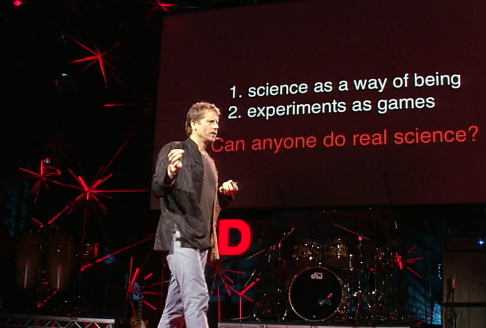So what is evolution's answer to the problem of uncertainty? It's play. Now play is not simply a process.
所以进化给出不确定性的答案是什么呢?那就是玩乐。玩不仅仅是一个简单的过程。
Experts in play will tell you that actually it's a way of being. Play is one of the only human endeavors where uncertainty is actually celebrated.
玩乐的专家会告诉你,这其实是一种存在的方式。玩乐其实是赞颂不确定性的一种人类活动。
Uncertainty is what makes play fun. Right? It's adaptable to change. Right? It opens possibility, and it's cooperative.
不确定性让玩乐变得好玩起来。对吗?它会随着变化而改变。对吗?它开启了各种可能。它是合作的。
It's actually how we do our social bonding, and it's intrinsically motivated. What that means is that we play to play. Play is its own reward.
实际上我们的社会也是如此连结的。同时它是动机是内在的,也就是说,我们是为了玩而玩。它自己本身便是一种奖赏。
Now if you look at these five ways of being, these are the exact same ways of being you need in order to be a good scientist.
现在要是你再看看这五种存在方式,你会发现他们和你成为一名出色科学家所需的特质是一样的。
Science is not defined by the method section of a paper. It's actually a way of being, which is here, and this is true for anything that is creative.
科学并没有一纸定义。它实际上是一种存在方式,它就在这里,也在所有好玩的东西身上。
So if you add rules to play, you have a game. That's actually what an experiment is.
所以如果你给玩乐加上规则,你就得到了游戏。而实验其实就是这样的东西。
So armed with these two ideas, that science is a way of being and experiments are play, we asked, can anyone become a scientist?
那么具备了这两条概念,即,科学是一种存在方式而实验是一种玩乐。我们问,是不是任何人都能成为一名科学家呢?

And who better to ask than 25 eight- to 10-year-old children? Because they're experts in play.
这个问题,去问25名8至10岁的儿童是最好不过了吧?因为他们是玩乐的专家。
So I took my bee arena down to a small school in Devon, and the aim of this was to not just get the kids to see science differently,
所以我带着我的蜜蜂舞台,去了Devon的一所小学校,而这件事的目的,不只是为了让孩子们用一种不同的方法来看待科学。
but, through the process of science, to see themselves differently. Right? The first step was to ask a question.
更是通过这个过程,用不同的方法审视他们自己。对吗?第一步,是提出一个问题。
Now, I should say that we didn't get funding for this study because the scientists said small children couldn't make a useful contribution to science,
说实话这个研究我们没拿到任何资金支持,因为科学家们说这些小鬼头无法对科学做出有用的贡献,
and the teachers said kids couldn't do it. So we did it anyway. Right? Of course.
老师们也说小孩子做不到。不过不管怎样我们还是做了。对吗?肯定的。
So, here are some of the questions. I put them in small print so you wouldn't bother reading it.
好,这里是一些提出的提问。我把他们的字体缩小了,所以你们不用费神去读。
Point is that five of the questions that the kids came up with were actually the basis of science publication the last five to 15 years.
关键在于孩子们提出的问题中,有五个问题事实上是过去5~15年间科学发表的基础。
Right? So they were asking questions that were significant to expert scientists.
对吗?所以他们在问的问题对于专业的科学家来说,其实至关重要。












